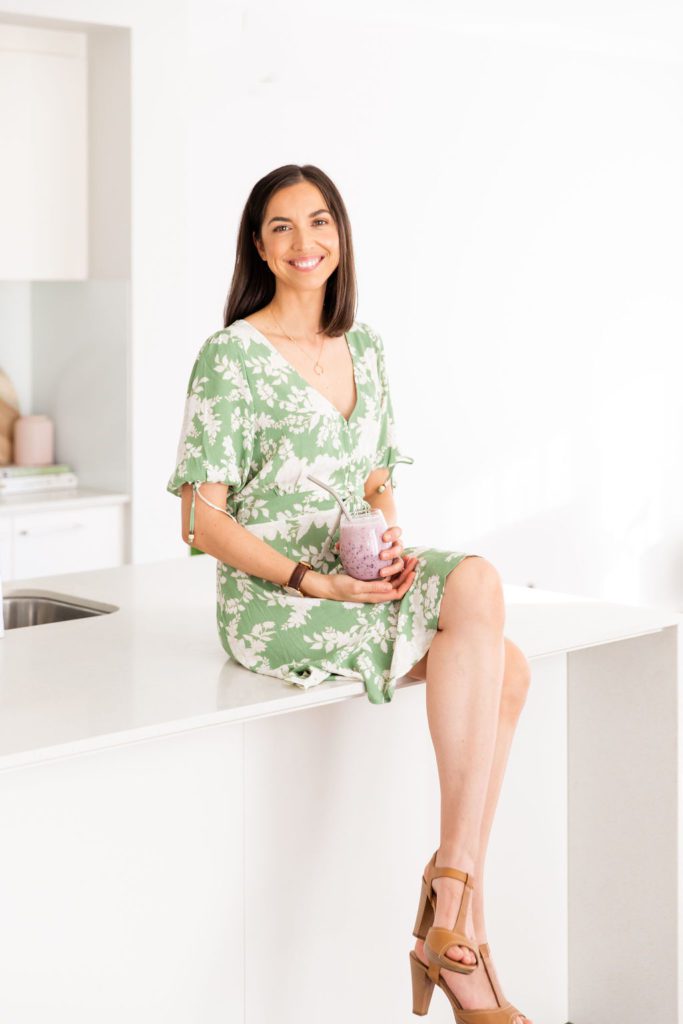THE BLOG
welcome to
For creative female founders ready to turn their vision into a timeless brand and sophisticated digital business while living a life that feels like artistry.
By Marina Vuckov (BHSc. Clinical Nutritionist)
Business woman. Mother. Wife. Friend. Chauffeur. Carer, cook, cleaner, organiser…and the list goes on. No matter what roles you have in life, it’s likely you’re always busy and rushing to the next thing. These days we are asked to juggle so many responsibilities and often with very little support or no village around us.
More than just being really tired, burnout is a deep, unrelenting fatigue that doesn’t go away after a couple of nights of good sleep. It is physical and mental exhaustion, resulting from prolonged and excessive physical, emotional and mental stress (World Health Organisation, 2019).
Burnout is a deep, unrelenting fatigue.
Burnout is more common than you might think, especially for women. Research has found that at least 1 in 3 of us experience work related burnout, and that self-employed women are at even greater risk. In addition, we’re more likely than men to experience burnout and worryingly, this gender gap has widened since the pandemic. And if you’re also a parent, balancing family responsibilities, work and your own wellbeing can seem even more impossible at times.
The tricky thing with burnout is that it can creep up on you. I know from personal experience.
Last year, I had finally finished my second degree. I was working on my business late every night, while juggling a second job, personal relationships and motherhood.
And I was okay – for a while.
But eventually, the exhaustion started to creep in, and overwhelm. I began getting sick often, and worst of all, my motivation and drive for life took a nosedive. It was not like me at all. I tried to ignore it and kept pushing through. Thankfully, I was jolted out of my ‘work work work’ state by my wonderful husband and when I took a moment to stop and take note of how I was really feeling, I knew things needed to change. I started making small changes in my life, slowly healing my body through the power of food, sleep and other daily habits. It took some time but slowly and surely I began to feel better. Don’t get me wrong, I still have to work at it to this day, and I’m no way perfect, but I know that a few simple and important habits will prevent me from feeling that way again.
So, what are some signs that you might be on the way to burnout? Here is a list of common symptoms below.
Common burnout symptoms
- deep fatigue – you might feel completely drained and exhausted day after day
- emotional overwhelm
- persistent mood changes (e.g. less patient, irritable, anxious or low mood)
- little or no motivation
- feeling disconnected from your social and/or family life
- altered sleep patterns (insomnia)
- episodes of anger or rage
- digestive issues (bloating, constipation, diarrhoea, food sensitivities)
- getting sick more often
- memory problems
The problem with burnout
Unfortunately, these days it’s seen as normal to always be busy, constantly stressed, living on little sleep and surviving on caffeine. In fact, society often glorifies ‘busyness’ and we’re expected to take on all the roles, often with little support.
But the trouble with continuing to push through and not allowing yourself time to rest and recharge is that this affects your body and mind on a deeper level.
Being in a constant stressed state maintains activation of your body’s ‘fight or flight’ response (which is only meant for acutely stressful events, such as running away from an angry dog) and eventually leads to imbalance in hormones such as cortisol, adrenaline and other stress hormones. Chronic stress impacts our digestive health as well, often causing discomfort, bloating and changes in our toilet habits. And burnout can lead to serious health issues like chronic fatigue, depression, thyroid issues, insulin resistance or even lowered immune function.
The other big problem with burnout – it impacts other areas and people in your life, such as your loved ones.

8 ways to prevent burnout with a holistic health approach
Thankfully, there is a LOT you can do to get your energy and health back on track. Below you will find a holistic perspective to nourishing your mind and body, through nutrition, movement and daily habits, to bring your body back into balance.
1. Boundaries, self-worth and mindset
It may seem impossible, but finding time for yourself is absolutely crucial to preventing and recovering from burnout. If you haven’t already, get organised and block out dedicated times for work, home duties and personal time – that’s time for you – and no, scrolling your phone in bed doesn’t count! If it helps, treat the personal time as an appointment in your schedule. Set a reminder on your phone – it’s non-negotiable!
Your personal time can be anything that helps you relax, recharge and reset. Sitting outside with a book and cup of tea, your Pilates class, meditation, a soothing bath – it’s completely personal. There might be times when you can’t make your ‘appointment’ and that’s okay. Sometimes unplanned things come up – if you run your own business or have children this might take a little more planning!
Okay, this is the important bit – your MINDSET around taking time to look after you. Be kind to yourself. Try not to let yourself feel guilty – and please remember, you matter, you are worthy, and you NEED to replenish your cup – otherwise you’ll have nothing to give to you or anyone else either.
Remember, you don’t have to always be busy to be worthy.
It’s time to be kind to yourself.
2. Get a check up
If you’re finding yourself feeling exhausted all the time, no matter how much sleep you get, or are struggling with other symptoms, it could be a good idea to see your GP who may send off for a few blood tests. Ongoing fatigue can be caused by many different reasons, and it’s important to rule out underlying issues, such as low iron, an underactive thyroid or insulin resistance. Several other tests may be appropriate, depending on your specific/individual picture, such as assessing for nutrient deficiencies, your cortisol levels or female sex hormones.
If you are also experiencing ongoing low mood or anxiety, feel like you’re struggling to cope, or that your overall quality of life has reduced, remember you can seek support and connect with a therapist.
Preventing burnout with nutrition
It can be hard to prioritise eating well when you’re seriously pressed for time and feel exhausted.
But the truth is, what you eat (as well as when and how you eat) will have a significant effect on your energy, moods, anxiety, sleep and the overall way your body functions (Muscaritoli, 2021).
This is the time to focus on nourishing, easy to digest foods, gut friendly fibres, regular meals and specific supportive nutrients and minimise foods which promote stress.
Food is energy and nourishment for our body, mind and soul.
3. Coffee is not breakfast
Okay, hear me out. I know you’re busy, tired and need an energy pick up first thing in the morning. But – morning time is when our stress hormone cortisol is at its highest (part of the normal hormonal rhythm). When you have caffeine, on an empty stomach, this just adds to the cortisol spike, and that ‘energy boost’ you feel is really your cortisol talking. It’s putting an additional stress on you. Now is the time to nourish your body.
I know it can be a hard pass to change that morning coffee habit, so why not try having something to eat before instead, or at least at the same time as your coffee as a start? This will help balance your blood glucose and cortisol levels and give you more even energy, without the mid-morning crash.
4. Regular meals are a must
Regular, nourishing meals are even more important when your body and hormones are in a stressed and depleted state. Now is not the time to be skipping meals, doing intermittent fasting or a super restrictive diet. This can lead to further hormone imbalance and make you feel even worse.
Instead, aim for at least 3 balanced meals per day, ideally always including a good source of protein, complex carbohydrates and some healthy fats. This will make a huge difference in your energy levels.
5. Plenty of colourful fruit and vegetables
Ongoing physical and psychological stress can cause depletion in some of our body’s nutrient stores, such as magnesium, zinc, vitamin C, iron, calcium and B vitamins. So really focusing on getting as many colourful, fresh fruits and especially vegetables in your diet is key, to give you the most nutrients possible and help your body heal. Why colourful? Well, brightly coloured foods are often richer in vitamins, minerals, antioxidants, anti-inflammatory compounds and will give you the greatest bang for your buck, so to speak! Aim for as much variety as possible.
6. Consider specific nutrient supplementation
While you’re working on building healthy eating habits, it can be useful to support your body with specific, high-quality nutrients so you can start to feel better sooner. I’d highly recommend that you seek advice from a qualified practitioner, such as a nutritionist, first, because not all supplements are created equal and testing beforehand may be needed (you should only supplement what you are deficient in). This is something I work with my wonderful clients on, on an individual, case to case basis.
Preventing burnout with Lifestyle medicine
7. The power of sleep
I know how hard it can be to go to bed early if you still have lots of work to do. There are deadlines to meet and sometimes, it’s the only quiet quality time you get to work. But think of sleep as ‘energy fuel’ – a time to fill up your tank. If you keep running on empty, eventually something will give and often that ends up being our health.
One of the things I work with my clients on is creating a calming pre-bedtime routine. How we approach the 1-2 hours before bed can make all the difference in how long it takes to get to sleep and the quality of your sleep.
Here are some practical tips for a better sleep:
- Dim all lights and screens at least 2 hours before bed time
- Switch off all screens at least 1 hour before bed (more is even better!)
- Have a relaxing activity to do before going to bed – this can be as little as 15-20 minutes of reading, gentle stretching, meditation, a bath – it can really help you switch off and get into relax/calm mode
8. Gentle exercise
Choosing a gentle form of movement is more beneficial when you are in a chronic stress state because high intensity exercise actually increases the stress hormone cortisol. So, choose something like a 30-minute walk, or a Pilates session over your HIIT class. Getting outside is fantastic as fresh air and nature has a relaxing effect on our nervous system and a positive effect on mood.
A few final words
Chronic stress and burnout can have serious effects on our physical and mental health. Though it can be really difficult to take time to slow down and prioritise yourself, it is absolutely essential and something we are all worthy of.
It’s also vital that the body gets nourishment through eating real, nutrient-dense foods, adequate sleep and movement. Looking at all the factors in your life which are adding to your stress and fatigue is essential for restoring your wellbeing.
Marina is a degree-qualified, holistic nutritionist and physiotherapist, with over 10 years in the health field. She works 1:1 with women specialising in the areas of fatigue, hormonal health, postpartum, perimenopause and digestive health. She considers the whole individual and provides personalised, holistic nutrition and lifestyle support and strives to empower her clients so they can thrive again and live the life they dream of.
Marina offers a free 10 minute chat if you’d like to find out more or just want to see if you’d be a good fit. Link here.
Marina is based in Adelaide, South Australia but consults online and sees women from all over Australia and New Zealand.
You can also follow Marina on Instagram at @marinavuckov_nutrition for more holistic health tips

References
Adam Bayes, Gabriela Tavella & Gordon Parker (2021) The biology of burnout: Causes and consequences, The World Journal of Biological Psychiatry, 22:9, 686-698, DOI: 10.1080/15622975.2021.1907713
Muscaritoli, M. (2021). The Impact of Nutrients on Mental Health and Well-Being: Insights From the Literature. Frontiers of Nutrition. https://doi.org/10.3389/fnut.2021.656290
Resurgo. The State of the Female Entrepreneur Mental Health. Accessed from https://www.resurgo.app/the-state-of-female-entrepreneur-mental-health-2020
World Health Organisation. (2019). Burnout. Accessed from https://www.who.int/news/item/28-05-2019-burn-out-an-occupational-phenomenon-international-classification-of-diseases
Leave a Reply Cancel reply
8 ways to prevent burnout with a holistic health approach
8 ways to prevent burnout with a holistic health approach
8 ways to prevent burnout with a holistic health approach
8 ways to prevent burnout with a holistic health approach
Burnout is more common than you might think, especially for women. Research has found that at least 1 in 3 of us experience work related burnout, and that self-employed women are at even greater risk. So what is burnout? How do you know if you have it & how can you avoid it?
Burnout is more common than you might think, especially for women. Research has found that at least 1 in 3 of us experience work related burnout, and that self-employed women are at even greater risk. So what is burnout? How do you know if you have it & how can you avoid it?
Burnout is more common than you might think, especially for women. Research has found that at least 1 in 3 of us experience work related burnout, and that self-employed women are at even greater risk. So what is burnout? How do you know if you have it & how can you avoid it?
Burnout is more common than you might think, especially for women. Research has found that at least 1 in 3 of us experience work related burnout, and that self-employed women are at even greater risk. So what is burnout? How do you know if you have it & how can you avoid it?
Most Popular
Get FREE access to all the tools you need to quit hiding your genius and show up as a fearless leader who runs in the direction of her dreams.
You're not stuck, you simply need to move.
Make friends with fear NOW!
